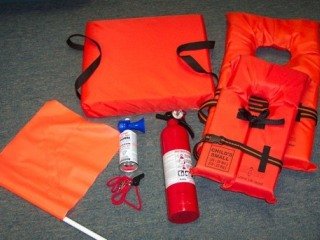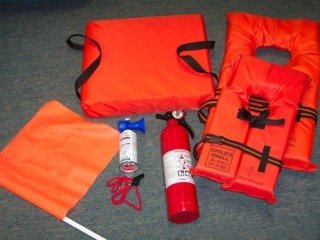 When I close my eyes and think about fishing, I picture the shallow, marshy flats of the Gulf and the excitement of a school tailing redfish as I stand on the gently swaying deck of a Blackjack or a Mako. I’m sure your own imaginations conjure up a similar image—boat and all—as most will often consider fishing and boats to be synonymous. After all, the rare freedom that boats afford us is what draws us to the outdoors in the first place. However, while boating is fun and can make fishing a lake easy, it is very important that those with their own maintain proper safety protocols and employ common sense whenever they’re enjoying their watercraft.
When I close my eyes and think about fishing, I picture the shallow, marshy flats of the Gulf and the excitement of a school tailing redfish as I stand on the gently swaying deck of a Blackjack or a Mako. I’m sure your own imaginations conjure up a similar image—boat and all—as most will often consider fishing and boats to be synonymous. After all, the rare freedom that boats afford us is what draws us to the outdoors in the first place. However, while boating is fun and can make fishing a lake easy, it is very important that those with their own maintain proper safety protocols and employ common sense whenever they’re enjoying their watercraft.
One important responsibility that every boat owner has is ensuring that they have all the required (and even not required) equipment on board their vessel at all times. The first, and arguably most important, item is enough life jackets for each person on board at any given time. If you have regular passengers, make sure that each person’s designated life jacket fits them properly and that they don’t exceed the device’s weight limit. Also, some states also require that you keep a throwable floatation device if your boat is shorter than a specific length.
Another requirement of owning and operating a boat is keeping your registration and affixing your boat’s identification numbers along the bow. Just like license plates on cars, your boat’s identification should be clearly visible. You can buy the adhesive letters and numbers at most hardware stores and anywhere boating equipment is sold. Keep any registration papers, along with any other important documents, in a water-proof bag.
It’s also a good idea to keep on-board navigation lights stowed and within easy access. These come in handy should you be caught on the water after the sun sets. Keeping a horn or whistle is also advised, as they will help alert others should you, knock on wood, encounter a problem on the water. Oars are also smart tools to have on board. In case of engine failure, you don’t want to be stranded and oars will help you paddle to shore. Lastly, as with any piece of equipment that runs on oil and gas, the risk of a fire is always present. A fire extinguisher that is U.S. Coast Guard approved is required by boat owners.
To ensure the safety of everyone on the water—yourself, your passengers, and other outdoorsmen included—make sure that you’re compliant with your state’s boating laws and practice common sense. Boats are basically cars that float, so be as careful as you would when driving. DO NOT impair your ability to pilot the boat by drinking or operating the boat if you’re not physically able to safely do so. Any boat on the water can be checked by a DNR agent, game warden, or a police officer at any time, so make sure to follow the rules and equip your vessel with the required equipment. After all, it takes a few extra dollars to stock your boat with life jackets or a fire extinguisher, which pales in comparison to the fines, and possible arrest, that you’ll be charged with should you be stopped and caught without them.








